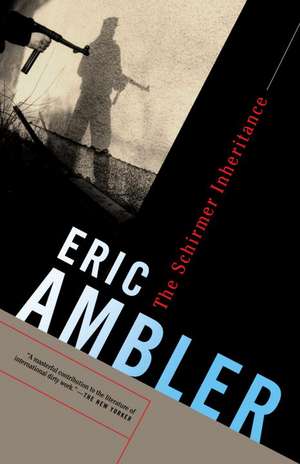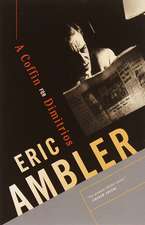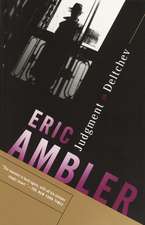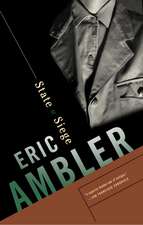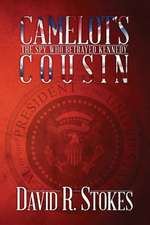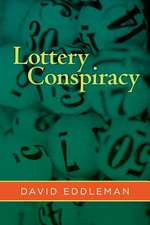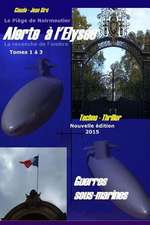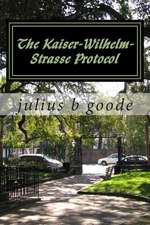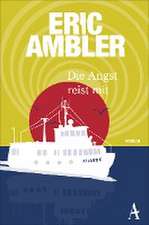The Schirmer Inheritance: Vintage Crime/Black Lizard
Autor Ambler, Eric Ambleren Limba Engleză Paperback – 30 noi 2003
Din seria Vintage Crime/Black Lizard
-
 Preț: 96.74 lei
Preț: 96.74 lei -
 Preț: 100.98 lei
Preț: 100.98 lei -
 Preț: 116.64 lei
Preț: 116.64 lei -
 Preț: 100.57 lei
Preț: 100.57 lei -
 Preț: 101.58 lei
Preț: 101.58 lei -
 Preț: 97.34 lei
Preț: 97.34 lei -
 Preț: 104.39 lei
Preț: 104.39 lei -
 Preț: 100.76 lei
Preț: 100.76 lei -
 Preț: 106.23 lei
Preț: 106.23 lei -
 Preț: 103.44 lei
Preț: 103.44 lei -
 Preț: 101.58 lei
Preț: 101.58 lei -
 Preț: 81.06 lei
Preț: 81.06 lei -
 Preț: 100.35 lei
Preț: 100.35 lei -
 Preț: 109.71 lei
Preț: 109.71 lei -
 Preț: 102.70 lei
Preț: 102.70 lei -
 Preț: 95.51 lei
Preț: 95.51 lei -
 Preț: 107.68 lei
Preț: 107.68 lei -
 Preț: 123.57 lei
Preț: 123.57 lei -
 Preț: 112.97 lei
Preț: 112.97 lei -
 Preț: 95.10 lei
Preț: 95.10 lei -
 Preț: 121.82 lei
Preț: 121.82 lei -
 Preț: 91.27 lei
Preț: 91.27 lei -
 Preț: 114.69 lei
Preț: 114.69 lei -
 Preț: 92.74 lei
Preț: 92.74 lei -
 Preț: 86.61 lei
Preț: 86.61 lei -
 Preț: 106.64 lei
Preț: 106.64 lei -
 Preț: 98.78 lei
Preț: 98.78 lei -
 Preț: 101.17 lei
Preț: 101.17 lei -
 Preț: 94.35 lei
Preț: 94.35 lei -
 Preț: 101.58 lei
Preț: 101.58 lei -
 Preț: 91.05 lei
Preț: 91.05 lei -
 Preț: 80.41 lei
Preț: 80.41 lei -
 Preț: 111.58 lei
Preț: 111.58 lei -
 Preț: 128.00 lei
Preț: 128.00 lei -
 Preț: 96.11 lei
Preț: 96.11 lei -
 Preț: 96.33 lei
Preț: 96.33 lei -
 Preț: 104.48 lei
Preț: 104.48 lei -
 Preț: 109.49 lei
Preț: 109.49 lei -
 Preț: 99.94 lei
Preț: 99.94 lei -
 Preț: 111.58 lei
Preț: 111.58 lei -
 Preț: 102.40 lei
Preț: 102.40 lei -
 Preț: 106.45 lei
Preț: 106.45 lei -
 Preț: 100.57 lei
Preț: 100.57 lei -
 Preț: 94.06 lei
Preț: 94.06 lei -
 Preț: 98.15 lei
Preț: 98.15 lei -
 Preț: 162.71 lei
Preț: 162.71 lei -
 Preț: 101.39 lei
Preț: 101.39 lei -
 Preț: 113.56 lei
Preț: 113.56 lei -
 Preț: 95.51 lei
Preț: 95.51 lei -
 Preț: 93.22 lei
Preț: 93.22 lei
Preț: 91.27 lei
Nou
Puncte Express: 137
Preț estimativ în valută:
17.47€ • 18.17$ • 14.42£
17.47€ • 18.17$ • 14.42£
Carte disponibilă
Livrare economică 24 martie-07 aprilie
Preluare comenzi: 021 569.72.76
Specificații
ISBN-13: 9780375726767
ISBN-10: 0375726764
Pagini: 224
Dimensiuni: 133 x 204 x 16 mm
Greutate: 0.23 kg
Editura: Vintage Crime/Black Lizard
Seria Vintage Crime/Black Lizard
ISBN-10: 0375726764
Pagini: 224
Dimensiuni: 133 x 204 x 16 mm
Greutate: 0.23 kg
Editura: Vintage Crime/Black Lizard
Seria Vintage Crime/Black Lizard
Extras
1
George Carey came from a Delaware family that looked like an illustration for an advertisement of an expensive make of car. His father was a prosperous doctor with snow-white hair. His mother came from an old Philadelphia family and was an important member of the garden club. His brothers were tall, solid, and handsome. His sisters were slim, strong, and vivacious. All had fine regular teeth, which showed when they smiled. The whole family, indeed, looked so happy, so secure, and so successful that it was difficult not to suspect that the truth about them might be different. But no, they actually were happy, secure, and successful. They were also exceedingly smug.
George was the youngest son and, although his shoulders were not so broad as those of his brothers nor his smile as self-satisfied, he was the most talented and intelligent member of the family. When the glories of their football-playing days had departed, his brothers had made their ways aimlessly into business. George's plans for the future had been clear-cut from the moment he left high school. Despite his father's hope for a successor in his practice, George had declined to pretend to an interest in medicine which he did not feel. What he wanted to go in for was law; and not the criminal, courtroom kind, but the kind that led in early middle age to the presidencies of railroads and steel corporations or to high political office. But while the war, which came just after he had been graduated from Princeton, had removed much of his solemnity and smugness and had had beneficial effects upon his sense of humour, it had done nothing to change his mind about his chosen profession. After four and a half years as a bomber pilot, he went to Harvard Law School. He graduated, cum laude, early in 1949. Then, having spent a useful year as secretary to a learned and famous judge, he joined Lavater, Powell and Sistrom.
The firm of Lavater, Powell and Sistrom of Philadelphia is one of the really important law offices of the eastern United States, and the long list of partners reads like a selection of promising candidates for a vacancy on the Supreme Court. No doubt its massive reputation still derives to some extent from memories of the vast utilities manipulations with which it was concerned in the twenties; but there have been few corporation cases of any magnitude during the last thirty years in which the firm has not held an important brief. It remains a virile, forward-looking concern, and to be invited to join it is a mark of approbation most flattering to a young lawyer.
Thus, as he arranged his belongings in one of Lavater's comfortably furnished offices, George had reason to feel satisfied with the progress of his career. Admittedly, he was a little old for the somewhat junior position he occupied, but he was shrewd enough to realize that his four years in the Air Corps had not been wholly wasted from a professional point of view, and that the distinction of his war record had had quite as much to do with his presence at the Lavater firm as his work at law school or the warm recommendations of the learned judge. Now, if all went well (and why shouldn't it?), he could look forward to rapid advancement, valuable contacts, and an expanding personal reputation. He felt that he had arrived.
The news that he was to do some work on the Schneider Johnson case came, then, as a disagreeable blow. It was also a surprise of another kind. The sort of business that Lavater, Powell and Sistrom normally handled was the sort that made reputations as surely as it made money. From what George remembered of the Schneider Johnson case, it was just the sort of slapstick affair that a corporation lawyer with a thought for his reputation would pay to stay clear of.
It had been one of the notorious missing-heir-to-a-fortune absurdities of the pre-war years.
In 1938, Amelia Schneider Johnson, a senile old woman of eighty-one, had died in Lamport, Pennsylvania. She had lived alone in the decrepit frame house which had been the late Mr. Johnson's wedding present to her, and her declining years had been passed in an atmosphere of genteel poverty. When she had died, however, it had been found that her estate included three million dollars in bonds which she had inherited in the twenties from her brother, Martin Schneider, a soft-drink tycoon. She had had an eccentric distrust of banks and safe-deposit boxes and had kept the bonds in a tin trunk under her bed. She had also distrusted lawyers and had made no will. In Pennsylvania, at the time, the law governing intestacy had been determined by an act of 1917 which said, in effect, that anyone with even a remote blood-relationship to the deceased might be entitled to a share in the estate. Amelia Schneider Johnson's only known relative had been an elderly spinster, Miss Clothilde Johnson; but she had been a sister-in-law and therefore had not qualified under the act. With the enthusiastic and disastrous co-operation of the newspapers, a search for Amelia's blood-relations had begun.
It was, George thought, all too easy to understand the newspapers' eagerness. They had scented another Garrett case. Old Mrs. Garrett had died in 1930, leaving seventeen million dollars and no will, and here was the case eight years later, still going strong, with three thousand lawyers still chiselling away, twenty-six thousand claimants to the money, and a fine smell of corruption over all. The Schneider Johnson thing could last as long. True, it was smaller, but size wasn't everything. It had plenty of human angles--a fortune at stake, the romantic isolation of the old lady's declining years (she had lost her only son in the Argonne), the lonely death without a relative at the bedside, the fruitless search for the will--there was no reason why it should not have staying-power, too. The name Schneider and its American modifications were widely distributed. The old girl must have had blood-relatives somewhere even if she hadn't known them. Or him! Or her! Yes, there might even turn out to be a one hundred per cent nonsharing heir! All right, then, where was he? Or she? On a farm in Wisconsin? In a real-estate office in California? Behind the counter of a drugstore in Texas? Which of the thousands of Schneiders, Snyders, and Sniders in America was going to be the luck one? Who was the unsuspecting millionaire? Corn? Well, maybe, but always good for a follow-up, and of nation-wide interest.
And of nation-wide interest it had proved. By the beginning of 1939, the administrator of the estate had been notified of over eight thousand claims to be the missing heir, an army of disreputable lawyers had moved in to exploit the claimants, and the whole case had begun to soar rapidly into the cloud-cuckoo land of high fantasy, skullduggery, and courtroom farce in which it was to remain until, on the outbreak of war, it had fallen suddenly into oblivion.
What business Lavater, Powell and Sistrom could have with the resurrection of so unsavoury a corpse, George could not imagine.
It was Mr. Budd, one of the senior partners, who enlightened him.
The main burden of the Schneider Johnson estate had been borne by Messrs. Moreton, Greener and Cleek, an old-fashioned Philadelphia law firm of great respectability. They had been Miss Clothilde Johnson's attorneys and had conducted the formal search for a will on her instructions. The intestacy duly established, the matter had come before the Orphans' Court in Philadelphia, and the Register of Wills had appointed Robert L. Moreton as administrator of the estate. He had remained the administrator until the end of 1944.
"And very nice too," said Mr. Budd. "If only he'd had the sense to leave it at that, I wouldn't have blamed him. But no, the cockle-brained old coot retained his own firm as attorneys for the administrator. Jeepers, in a case like that it was suicidal!"
Mr. Budd was a pigeon-chested man with a long head, a neat, clipped moustache, and bifocal glasses. He had a ready smile, a habit of using out-of-date colloquialisms, and an air of careless good-humour of which George was deeply suspicious.
"The combined fees," George said carefully, "must have been pretty big on an estate of that size."
"No fees," declared Mr Budd, "are big enough to make it worth while for a decent law office to get mixed up with a lot of ambulance-chasers and crooks. There are dozens of these inheritance cases hanging fire all over the world. Look at the Abdul Hamid estate! The British got tied up in that one and it's been going on for thirty years or more. That'll probably never be settled. Look at the Garrett case! Think how many reputations that's damaged. Shucks! It's always the same. Is A an imposter? Is B out of his mind? Who died before whom? Is the old photograph Aunt Sarah or Aunt Flossie? Has a forger been at work with faded ink?" He waved his arms disparagingly. "I tell you, George, in my opinion the Schneider Johnson case pretty well finished Moreton, Greener and Cleek as a regular law firm. And when Bob Moreron got sick in '44 and had to retire, that was the end. They dissolved."
"Couldn't Greener or Cleek have taken over as administrator?"
Mr. Budd pretended to look shocked. "My dear George, you don't take over an appointment like that. It's a reward for good and faithful service. In this case, our learned, highly respected, and revered John J. Sistrom was the lucky man."
"Oh. I see."
"The investments do the work, George, our John J. takes the fees as administrator. However," Mr. Budd continued with a trace of satisfaction in his voice, "it doesn't look as if he's going to do so much longer. You'll see why in a moment. From what old Bob Moreton told me at the time, the position was originally this. Amelia's father was named Hans Schneider. He was a German who'd immigrated in 1849. Bob Moreton and his partners were pretty well convinced in the end that, if there were anybody at all entitled to take the estate, it was one of the old man's relatives back in Germany. But the whole thing was complicated by the representation question. Do you know anything about that, George?"
"Bregy, discussing the 1947 act, gives a very clear summary of the former rules."
"That's dandy." Mr. Budd grinned. "Because, frankly, I don't know a thing about it. Now, leaving out all the newspaper nonsense, here's what happened to the case. In '39 old Bob Moreton went off to Germany to check up on the other side of the Schneider family. Self-preservation, of course. He needed facts to go on if he was going to deal with all those phony claims. Then, when he got back, the damnedest thing happened. The damnedest things were always happening on that screwy case. It seemed that the Nazis had got wind of Bob's inquiries. What they did was to take a quick look into the thing themselves and produce an old man named Rudolph Schneider. Then they claimed the whole estate on his behalf."
"I remember that," George said. "They hired McClure to act for them."
"That's right. This Rudolph was from Dresden or some such place and they said that he was a first cousin of Amelia Johnson. Moreton, Greener and Cleek fought the claim. Said the documents the Krauts produced were forged. Anyway, the case was still before the courts when we got into the war in '41, and that finished it as far as they were concerned. The Alien Property Custodian in Washington moved in and filed a claim. Because of the German claim of course. The case froze. When he retired, Bob Moreton handed over all the documents to John J. There were over two tons of them and they're down in our vaults right now, just where they were left when Moreton, Greener and Cleek delivered them in '44. Nobody's ever troubled to look them over. No reason to. Well, now there is a reason."
George's heart sank. "Oh, yes?"
By choosing this moment to fill his pipe Mr. Budd avoided George's eyes as he went on. "This is the situation, George. It seems that with the appreciation of values and interest the estate is worth over four million now and the Commonwealth of Pennsylvania has decided to exercise its rights under the act and claim the lot. However, they've asked John J., as administrator, if he proposes to fight them on it, and, just for form's sake, he feels we ought to check through the documents to make sure that there's no reasonable claim outstanding. So that's what I want you to do, George. Just check through for him. Make sure he's not overlooking anything. O.K.?"
"Yes, sir. O.K."
But he did nor quite succeed in keeping a note of resignation out of his voice. Mr. Budd looked up with a sympathetic chuckle. "And if it'll make you feel any better about the job, George," he said, "I can tell you that we've been getting short of vault space for some time now. If you can get that load of junk out of the way you'll be earning the heartfelt thanks of the entire office."
George managed to smile.
2
He had no difficulty in finding the Schneider Johnson records. They were parcelled up in damp-proof wrappings and had a storage vault to themselves, which they filled from floor to ceiling. It was clear that Mr. Budd's estimate of their total weight had not been exaggerated. Fortunately, all the parcels had been carefully labelled and arranged systematically. Having made sure that he understood the system which had been employed, George made a selection of the parcels and had them carried up to his office.
It was late in the afternoon when he started work and, with some idea of getting a general picture of the case before settling down to work seriously on the claims, he had brought up a bulky parcel labelled: "Schneider Johnson Press Clippings." The label proved to be slightly misleading. What in fact the parcel contained was the record of Messrs. Moreton, Greener and Cleek's hopeless battle with the press and their efforts to stem the flood of nonsensical claims that was overwhelming them. It made pathetic reading.
The record began two days after Mr. Moreton had been appointed administrator of the estate. A New York tabloid had discovered that Amelia's father, Hans Schneider ("the Old Forty-niner," as the paper called him), had married a New York girl named Mary Smith. This meant, the paper had contended excitedly, that the name of the missing heir could be Smith as well as Schneider.
George Carey came from a Delaware family that looked like an illustration for an advertisement of an expensive make of car. His father was a prosperous doctor with snow-white hair. His mother came from an old Philadelphia family and was an important member of the garden club. His brothers were tall, solid, and handsome. His sisters were slim, strong, and vivacious. All had fine regular teeth, which showed when they smiled. The whole family, indeed, looked so happy, so secure, and so successful that it was difficult not to suspect that the truth about them might be different. But no, they actually were happy, secure, and successful. They were also exceedingly smug.
George was the youngest son and, although his shoulders were not so broad as those of his brothers nor his smile as self-satisfied, he was the most talented and intelligent member of the family. When the glories of their football-playing days had departed, his brothers had made their ways aimlessly into business. George's plans for the future had been clear-cut from the moment he left high school. Despite his father's hope for a successor in his practice, George had declined to pretend to an interest in medicine which he did not feel. What he wanted to go in for was law; and not the criminal, courtroom kind, but the kind that led in early middle age to the presidencies of railroads and steel corporations or to high political office. But while the war, which came just after he had been graduated from Princeton, had removed much of his solemnity and smugness and had had beneficial effects upon his sense of humour, it had done nothing to change his mind about his chosen profession. After four and a half years as a bomber pilot, he went to Harvard Law School. He graduated, cum laude, early in 1949. Then, having spent a useful year as secretary to a learned and famous judge, he joined Lavater, Powell and Sistrom.
The firm of Lavater, Powell and Sistrom of Philadelphia is one of the really important law offices of the eastern United States, and the long list of partners reads like a selection of promising candidates for a vacancy on the Supreme Court. No doubt its massive reputation still derives to some extent from memories of the vast utilities manipulations with which it was concerned in the twenties; but there have been few corporation cases of any magnitude during the last thirty years in which the firm has not held an important brief. It remains a virile, forward-looking concern, and to be invited to join it is a mark of approbation most flattering to a young lawyer.
Thus, as he arranged his belongings in one of Lavater's comfortably furnished offices, George had reason to feel satisfied with the progress of his career. Admittedly, he was a little old for the somewhat junior position he occupied, but he was shrewd enough to realize that his four years in the Air Corps had not been wholly wasted from a professional point of view, and that the distinction of his war record had had quite as much to do with his presence at the Lavater firm as his work at law school or the warm recommendations of the learned judge. Now, if all went well (and why shouldn't it?), he could look forward to rapid advancement, valuable contacts, and an expanding personal reputation. He felt that he had arrived.
The news that he was to do some work on the Schneider Johnson case came, then, as a disagreeable blow. It was also a surprise of another kind. The sort of business that Lavater, Powell and Sistrom normally handled was the sort that made reputations as surely as it made money. From what George remembered of the Schneider Johnson case, it was just the sort of slapstick affair that a corporation lawyer with a thought for his reputation would pay to stay clear of.
It had been one of the notorious missing-heir-to-a-fortune absurdities of the pre-war years.
In 1938, Amelia Schneider Johnson, a senile old woman of eighty-one, had died in Lamport, Pennsylvania. She had lived alone in the decrepit frame house which had been the late Mr. Johnson's wedding present to her, and her declining years had been passed in an atmosphere of genteel poverty. When she had died, however, it had been found that her estate included three million dollars in bonds which she had inherited in the twenties from her brother, Martin Schneider, a soft-drink tycoon. She had had an eccentric distrust of banks and safe-deposit boxes and had kept the bonds in a tin trunk under her bed. She had also distrusted lawyers and had made no will. In Pennsylvania, at the time, the law governing intestacy had been determined by an act of 1917 which said, in effect, that anyone with even a remote blood-relationship to the deceased might be entitled to a share in the estate. Amelia Schneider Johnson's only known relative had been an elderly spinster, Miss Clothilde Johnson; but she had been a sister-in-law and therefore had not qualified under the act. With the enthusiastic and disastrous co-operation of the newspapers, a search for Amelia's blood-relations had begun.
It was, George thought, all too easy to understand the newspapers' eagerness. They had scented another Garrett case. Old Mrs. Garrett had died in 1930, leaving seventeen million dollars and no will, and here was the case eight years later, still going strong, with three thousand lawyers still chiselling away, twenty-six thousand claimants to the money, and a fine smell of corruption over all. The Schneider Johnson thing could last as long. True, it was smaller, but size wasn't everything. It had plenty of human angles--a fortune at stake, the romantic isolation of the old lady's declining years (she had lost her only son in the Argonne), the lonely death without a relative at the bedside, the fruitless search for the will--there was no reason why it should not have staying-power, too. The name Schneider and its American modifications were widely distributed. The old girl must have had blood-relatives somewhere even if she hadn't known them. Or him! Or her! Yes, there might even turn out to be a one hundred per cent nonsharing heir! All right, then, where was he? Or she? On a farm in Wisconsin? In a real-estate office in California? Behind the counter of a drugstore in Texas? Which of the thousands of Schneiders, Snyders, and Sniders in America was going to be the luck one? Who was the unsuspecting millionaire? Corn? Well, maybe, but always good for a follow-up, and of nation-wide interest.
And of nation-wide interest it had proved. By the beginning of 1939, the administrator of the estate had been notified of over eight thousand claims to be the missing heir, an army of disreputable lawyers had moved in to exploit the claimants, and the whole case had begun to soar rapidly into the cloud-cuckoo land of high fantasy, skullduggery, and courtroom farce in which it was to remain until, on the outbreak of war, it had fallen suddenly into oblivion.
What business Lavater, Powell and Sistrom could have with the resurrection of so unsavoury a corpse, George could not imagine.
It was Mr. Budd, one of the senior partners, who enlightened him.
The main burden of the Schneider Johnson estate had been borne by Messrs. Moreton, Greener and Cleek, an old-fashioned Philadelphia law firm of great respectability. They had been Miss Clothilde Johnson's attorneys and had conducted the formal search for a will on her instructions. The intestacy duly established, the matter had come before the Orphans' Court in Philadelphia, and the Register of Wills had appointed Robert L. Moreton as administrator of the estate. He had remained the administrator until the end of 1944.
"And very nice too," said Mr. Budd. "If only he'd had the sense to leave it at that, I wouldn't have blamed him. But no, the cockle-brained old coot retained his own firm as attorneys for the administrator. Jeepers, in a case like that it was suicidal!"
Mr. Budd was a pigeon-chested man with a long head, a neat, clipped moustache, and bifocal glasses. He had a ready smile, a habit of using out-of-date colloquialisms, and an air of careless good-humour of which George was deeply suspicious.
"The combined fees," George said carefully, "must have been pretty big on an estate of that size."
"No fees," declared Mr Budd, "are big enough to make it worth while for a decent law office to get mixed up with a lot of ambulance-chasers and crooks. There are dozens of these inheritance cases hanging fire all over the world. Look at the Abdul Hamid estate! The British got tied up in that one and it's been going on for thirty years or more. That'll probably never be settled. Look at the Garrett case! Think how many reputations that's damaged. Shucks! It's always the same. Is A an imposter? Is B out of his mind? Who died before whom? Is the old photograph Aunt Sarah or Aunt Flossie? Has a forger been at work with faded ink?" He waved his arms disparagingly. "I tell you, George, in my opinion the Schneider Johnson case pretty well finished Moreton, Greener and Cleek as a regular law firm. And when Bob Moreron got sick in '44 and had to retire, that was the end. They dissolved."
"Couldn't Greener or Cleek have taken over as administrator?"
Mr. Budd pretended to look shocked. "My dear George, you don't take over an appointment like that. It's a reward for good and faithful service. In this case, our learned, highly respected, and revered John J. Sistrom was the lucky man."
"Oh. I see."
"The investments do the work, George, our John J. takes the fees as administrator. However," Mr. Budd continued with a trace of satisfaction in his voice, "it doesn't look as if he's going to do so much longer. You'll see why in a moment. From what old Bob Moreton told me at the time, the position was originally this. Amelia's father was named Hans Schneider. He was a German who'd immigrated in 1849. Bob Moreton and his partners were pretty well convinced in the end that, if there were anybody at all entitled to take the estate, it was one of the old man's relatives back in Germany. But the whole thing was complicated by the representation question. Do you know anything about that, George?"
"Bregy, discussing the 1947 act, gives a very clear summary of the former rules."
"That's dandy." Mr. Budd grinned. "Because, frankly, I don't know a thing about it. Now, leaving out all the newspaper nonsense, here's what happened to the case. In '39 old Bob Moreton went off to Germany to check up on the other side of the Schneider family. Self-preservation, of course. He needed facts to go on if he was going to deal with all those phony claims. Then, when he got back, the damnedest thing happened. The damnedest things were always happening on that screwy case. It seemed that the Nazis had got wind of Bob's inquiries. What they did was to take a quick look into the thing themselves and produce an old man named Rudolph Schneider. Then they claimed the whole estate on his behalf."
"I remember that," George said. "They hired McClure to act for them."
"That's right. This Rudolph was from Dresden or some such place and they said that he was a first cousin of Amelia Johnson. Moreton, Greener and Cleek fought the claim. Said the documents the Krauts produced were forged. Anyway, the case was still before the courts when we got into the war in '41, and that finished it as far as they were concerned. The Alien Property Custodian in Washington moved in and filed a claim. Because of the German claim of course. The case froze. When he retired, Bob Moreton handed over all the documents to John J. There were over two tons of them and they're down in our vaults right now, just where they were left when Moreton, Greener and Cleek delivered them in '44. Nobody's ever troubled to look them over. No reason to. Well, now there is a reason."
George's heart sank. "Oh, yes?"
By choosing this moment to fill his pipe Mr. Budd avoided George's eyes as he went on. "This is the situation, George. It seems that with the appreciation of values and interest the estate is worth over four million now and the Commonwealth of Pennsylvania has decided to exercise its rights under the act and claim the lot. However, they've asked John J., as administrator, if he proposes to fight them on it, and, just for form's sake, he feels we ought to check through the documents to make sure that there's no reasonable claim outstanding. So that's what I want you to do, George. Just check through for him. Make sure he's not overlooking anything. O.K.?"
"Yes, sir. O.K."
But he did nor quite succeed in keeping a note of resignation out of his voice. Mr. Budd looked up with a sympathetic chuckle. "And if it'll make you feel any better about the job, George," he said, "I can tell you that we've been getting short of vault space for some time now. If you can get that load of junk out of the way you'll be earning the heartfelt thanks of the entire office."
George managed to smile.
2
He had no difficulty in finding the Schneider Johnson records. They were parcelled up in damp-proof wrappings and had a storage vault to themselves, which they filled from floor to ceiling. It was clear that Mr. Budd's estimate of their total weight had not been exaggerated. Fortunately, all the parcels had been carefully labelled and arranged systematically. Having made sure that he understood the system which had been employed, George made a selection of the parcels and had them carried up to his office.
It was late in the afternoon when he started work and, with some idea of getting a general picture of the case before settling down to work seriously on the claims, he had brought up a bulky parcel labelled: "Schneider Johnson Press Clippings." The label proved to be slightly misleading. What in fact the parcel contained was the record of Messrs. Moreton, Greener and Cleek's hopeless battle with the press and their efforts to stem the flood of nonsensical claims that was overwhelming them. It made pathetic reading.
The record began two days after Mr. Moreton had been appointed administrator of the estate. A New York tabloid had discovered that Amelia's father, Hans Schneider ("the Old Forty-niner," as the paper called him), had married a New York girl named Mary Smith. This meant, the paper had contended excitedly, that the name of the missing heir could be Smith as well as Schneider.
Recenzii
“A masterful contribution to the literature of international dirty work." --The New Yorker
“As ingenious a tale as any Mr. Ambler has told. It is a wonderfully ingenious tale.” --Herald Tribune
“Thriller readers should hail this yarn with joy.” --San Francisco Chronicle
“Eric Ambler’s books show an unusual flair for creating alarm, if not despondency, in the gentle reader.”--The New York Times Book Review
“As ingenious a tale as any Mr. Ambler has told. It is a wonderfully ingenious tale.” --Herald Tribune
“Thriller readers should hail this yarn with joy.” --San Francisco Chronicle
“Eric Ambler’s books show an unusual flair for creating alarm, if not despondency, in the gentle reader.”--The New York Times Book Review
Notă biografică
Eric Ambler
